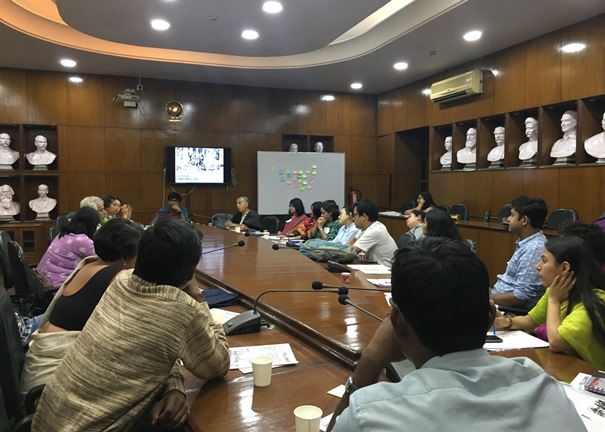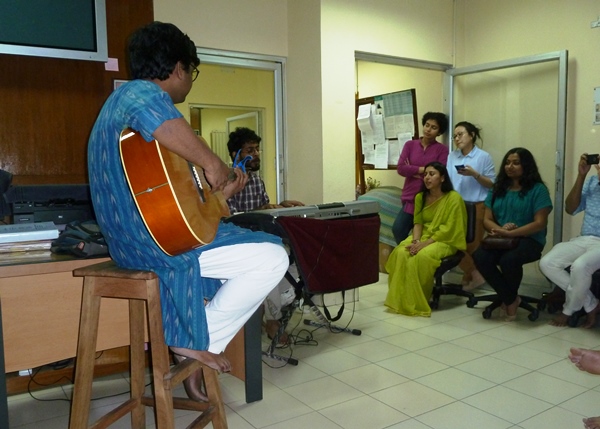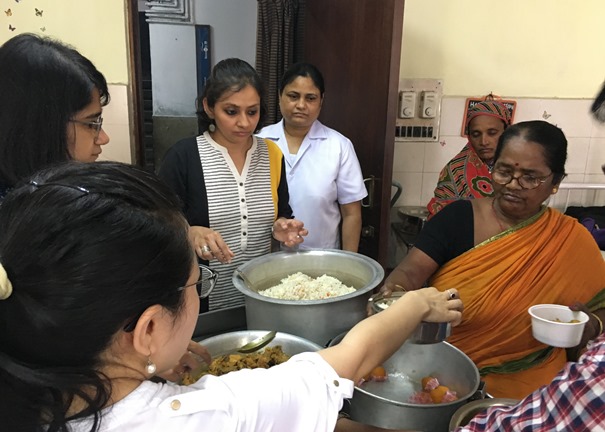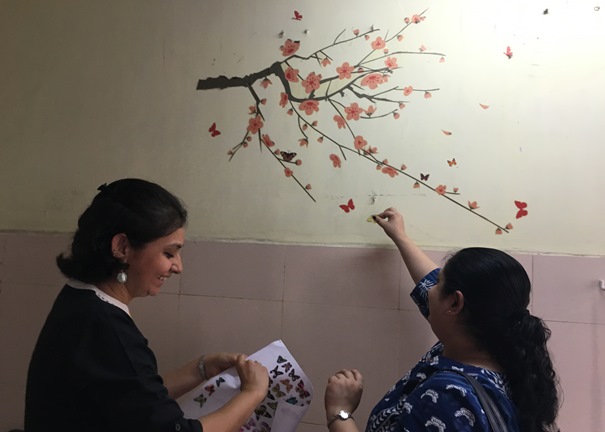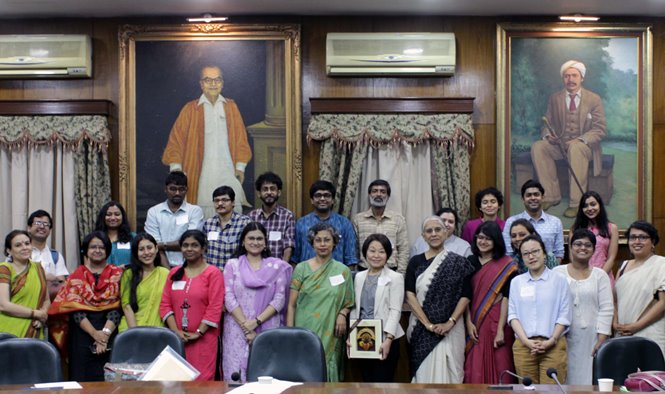Voices from the Sylff Community
May 10, 2018
JU-Sylff LANS Meet 2018
Report compiled by Sujaan Mukherjee, Sritama Chatterjee, and Shounak Adhikari
Local Association Networking Support (LANS) is a new support program intended to facilitate the organization of gatherings and other activities by groups of Sylff alumni, including local Sylff associations. Groups of five or more fellows and alumni from the same institution can apply to the Sylff Association for a maximum of US$5,000 per gathering to cover the long-distance transportation costs of participating fellows. This program was launched in September 2017, and the Jadavpur University Sylff Association (JU-Sylff Association) was the first to take advantage of it. In March 2018 the association organized a two-day event in Kolkata, India, inviting JU-Sylff fellows from Britain, Ireland, and other parts of India. The following is an introduction to the JU-Sylff Association and a report on the meeting organized by it.
***
INTRODUCTION
The JU-Sylff Association was delighted to learn about Local Association Networking Support (LANS), the newly introduced Sylff support program. We felt that the grant recognized and encouraged the strong spirit of group work that the JU-Sylff Association has always upheld. LANS offered an excellent opportunity to bring together fellows, graduated and current, to discuss their own individual research and brainstorm over collective goals to address social, cultural, and environmental issues that concern us all in different ways.
Activities of the JU-Sylff Association
It was in 2005 that the JU-Sylff Program launched its association with the generous support of the Tokyo Foundation’s Sylff Network Program (SNP). For the first three years the JU-Sylff Association was reliant on the SNP for financial support, but for the last 10 years we have continued our activities unabated with contributions from Sylff fellows and financial support from the university and the Sylff Steering Committee.
Every week the researchers—current and, if they are in town, graduated fellows—come for Monday meetings to discuss research, activities of the association, and larger sociopolitical issues with Professor Joyashree Roy, the project director. Depending on our areas of research, we are often prompted to get in touch with a graduated fellow in some part of the world who can help us answer questions raised in our work or give us a lead as to how our work can be translated into some meaningful action within our society.
About once a month the association organizes the JU-Sylff Lecture Series, where academics and activists, under the JU-Sylff banner, engage with Sylff and non-Sylff students and researchers of the university. Intense and focused discussions follow, as the lectures bring together a small group of interested researchers. These lectures are frequently delivered by graduated Sylff fellows, further providing a platform to interact and exchange ideas. The JU-Sylff Annual Newsletter, Fellows, also provides a useful forum for current and graduated researchers to discuss their work.
Our Vision for LANS Meet 2018
When the LANS grant was announced, we saw an opportunity to bring together in the same physical space graduated and current fellows, as well as mentors, to discuss our work and imagine ways in which our and Sylff’s larger goals can be achieved through teamwork and capacity building. Interaction with graduated fellows and mentors helps us develop our ideas and become better researchers, but it is largely limited to either email correspondence or personal meetings with those who happen to be in the city. The LANS Meet could also provide a platform for current and graduated fellows to showcase their extracurricular skills. JU-Sylff fellows who are currently working in different institutions across the world are doing outstanding work. We felt that the opportunity to bring them together, allowing to share their diverse and inspiring stories, could give us fresh energy to pursue our goals and ambitions and to think bigger.
The meet was conceptualized and organized by all participating Sylff fellows, but it would not have been possible without the special commitment of and team building done by Ritajyoti Bandyopadhyay, Payoshni Mitra, Purbasha Auddy, Sudeshna Dutta, Sujaan Mukherjee, and Sritama Chatterjee, with invaluable guidance from Professor Roy.
DAY ONE: PRESENCE AND CONFLUENCE
On March 21, graduated and current fellows began trickling into Jadavpur University well before the scheduled time of the inaugural LANS Meet. They greeted each other enthusiastically, reminiscing with old colleagues and making friends with new faces. We were honored to have with us Ms. Mari Suzuki, Sylff Association, director for leadership development of the Tokyo Foundation for Policy Research, who came especially to be a part of this special event. Her presence offered great encouragement to the fellows, and we were able to understand clearly that the goals we had set for ourselves were indeed in harmony with the larger Sylff mission and goals: to identify and support leaders for the future.
Apart from the fellows, many mentors of the JU-Sylff Program were present for the meet, including Professor Emerita Supriya Chaudhuri, Professor Amlan Dasgupta, Professor Samantak Das, Professor Paromita Chakravarti, Professor Sibashish Chatterjee, and Professor Kavita Panjabi. Members of the JU-Sylff Steering Committee attending the meet were Mr. Gour Krishna Pattanayak and Dr. Sanjay Gopal Sarkar, finance officer and joint registrar of Jadavpur University, respectively. The mentors and members of the Steering Committee have been with the Sylff community right from the program’s inception in 2003, when Jadavpur University was awarded a Sylff endowment.
In the august company of the Sylff fraternity, the latest issue of Fellows was introduced by Ms. Suzuki. The eleventh issue of Fellows addresses questions of academics’ role within and outside the walls of academia and their responsibility toward society at large. From this year, the newsletter will feature a guest editor from among graduated fellows, so as to increase the space for involvement and exchange.
Fellows’ Presentations and Group Discussion
Events were set in motion by Professor Roy, JU-Sylff project director. With Professor Chaudhuri chairing the opening session, fellows made brief presentations about their work; they had encapsulated their work in one slide each. With the same passion that had driven the fellows during their research under Sylff—and stayed with them afterward—they spoke about their work: their goals, their challenges, and their successes. They were also encouraged to think beyond their completed projects and speak to the assembled gathering about their dreams. What more did they want to do, not just individually but through teamwork?
On the one hand, the fellows spoke about the benefits that the Sylff program at Jadavpur University had offered them: through Monday meetings, progress report workshops, and the lecture series, it helped them structure their research and think beyond their own disciplines, indeed beyond the walls of academia. Many of the JU-Sylff fellows have incorporated into their work a strong sense of activism, as they try to make a positive impact on the society of which they are a part. This has happened at both the macro and micro levels, but it becomes evident from each fellow’s career that their leadership skills are growing from strength to strength.
As the discussion gathered momentum, new ideas and areas of common interest emerged. Among such areas are women’s rights and gender studies; studies of marginalized castes and communities; urban studies; sports; documentation and archive building; and the performing arts. The fellows decided that the best way to map these idea clusters was to put them in visual form. This was achieved by writing down ideas on sticky notes and arranging them on a whiteboard. What it reflected was how, by putting the individual voices together, a holistic idea of social development automatically emerged. The next step, naturally, was how to put these into action.
Capacity Building
The dialogue on capacity building, which was one of the initial goals of LANS Meet 2018, began. In keeping with the theme of the latest issue of Fellows, the discussion evolved around the ways in which the research that is conducted under the Sylff program could be disseminated in an efficient way so as to positively impact society at large. It was suggested that the JU-Sylff Association should focus on outreach. A number of ideas were put forth: along with the existing lecture series, a new Capacity Building Workshop Series was proposed, where Sylff fellows and mentors could offer workshops for the Jadavpur University student community on various skill sets, such as text editing, the ethics of fieldwork, and the use of archives. Potential plans for JU-Sylff LANS Meet 2019 were discussed in the hope that LANS will become an annual event in the JU-Sylff Association’s calendar.
Sylff fellows who are currently based in semi- or nonurban institutions suggested that the association could take upon itself a project to introduce students attending college in such areas to the idea of higher education and research as a viable career path. All fellows agreed that such dialogues are essential and should be the responsibility of fellows who are associated with a platform like Sylff.
Fellows who have worked with marginalized groups or with human subjects in the hope of finding solutions to the problems they face in society proposed that for the next LANS Meet (2019), a dialogue could be set up between other Sylff fellows and mentors and the individuals with whom they have interacted during the course of their research. This would not only allow researchers under the Sylff program to gain invaluable insights into the work done by their peers; it would also help give back to these communities some part of the knowledge generated through the addition of interpretive value by the researcher they have worked with.
Sylff Support Programs
Ms. Suzuki offered clarity in her description of the existing and new Sylff support programs, encouraging the JU-Sylff fellows to think big and plan ahead before applying for them. Fellows whose applications have been successful and those whose applications have not discussed how to write such proposals. Rimple Mehta spoke at length about her process. Sreerupa Sengupta remarked that what she found most valuable during the application process was that at each stage the reviewers at Sylff pushed her to think harder about the practicalities of her plan, while answering questions and informing her where her application could be improved. The Sylff Project Grant was mentioned, and ideas were exchanged about possible projects that might be supported by it.
Evening Gathering
Ms. Suzuki, Professor Roy, and the Sylff fellows made their way to the Global Change Program office on campus, where an informal cultural program took place. Fellows were able to showcase their extracurricular talents, as they conducted theater workshops, sang, and played music for everyone’s enjoyment.
The first day’s events ended on a note of great optimism. The fellows were energized, having connected with former peers and met new friends.
DAY TWO: SOCIAL ACTION PROGRAM
Visit to Premananda Memorial Leprosy Hospital
As part of the JU-Sylff Association’s Social Action Program, current fellows visit Premananda Memorial Leprosy Hospital each year. While this is always a fulfilling experience for the fellows and for the resident patients at the hospital, this year was exceptional. Unlike other years, the association linked the Social Action Program with the LANS Meet. This meant that graduated fellows, who had organized and visited the hospital during their time under Sylff, were able to revisit in a large group. Adding to that, we were honored to have with us Ms. Suzuki. Shounak Adhikari (MA, 2017) coordinated this year’s Social Action Program. Graduated and current fellows came forward enthusiastically to make this event a success.
The association bus reached the hospital at 11 am. After an opening address by Ms. Suzuki, Dr. Helen Roberts, who is superintendent of the hospital, gave a presentation on various aspects of leprosy and the activities of the Leprosy Mission Trust of India (TLMTI), whose history goes back 143 years. She informed us about how leprosy-affected people used to gather in the graveyard that now belongs to the hospital and, watching them in pain, Reverend Premananda Sen of the Oxford Mission started a dispensary for them. This eventually turned into a hospital.
Dr. Roberts spoke about recent advances in leprosy treatment and the ways in which the disease spreads. Twice a year healthcare workers go from house to house on behalf of the Leprosy Mission Trust to find persons showing symptoms of leprosy, and due to this initiative 30 percent more cases have been detected in the last two years compared to previous years. The hospital has started producing custom-made shoes for leprosy patients, which are now also delivered to other hospitals throughout the state. After the presentation, Ms. Roberts interacted with the fellows and answered their questions.
With the contributions from the JU-Sylff fraternity, the fellows planned different aspects of the visit, including offering medical supplies to augment the hospital’s stock, presenting gifts (such as board games) to the patients, and decorating the hospital wards using stickers. A special lunch was also arranged for the patients.
Upon arriving, the fellows distributed the gifts and handed the medical supplies to the hospital. A popular film, Tiger Zinda Hai, was screened. The film is chosen every year based on the preferences expressed by the patients. It is usually a popular Bollywood film that makes a positive impact on the morale of the residents. During an intermission, the special lunch was served by the fellows. The hospital staff took the fellows to the factory where the special shoes are made and demonstrated their craft.
While the patients were watching the movie, the fellows went to the wards and decorated the walls with floral stickers. All the participants, including Ms. Suzuki, joined in the decoration. When the patients came for lunch, they were delighted to find the decorations. All the fellows personally interacted and spoke with every patient. Some patients returned to watch the movie after lunch, while others stayed in their wards for routine checkup and physiotherapy. Meanwhile staff members, doctors, and Sylff fellows had their lunch together.
After the day’s proceedings, the team departed from the hospital, looking forward to the next visit to Premananda Memorial Leprosy Hospital and hoping that, in the following years, the event will be as much a success as it was during LANS Meet 2018.
LOOKING AHEAD
It came as a happy, although not unexpected, surprise that fellows began writing their ideas for next year’s LANS Meet shortly after the inaugural gathering on April 21 and 22, 2018. The JU-Sylff Association has created a space where such ideas are to be stored for future reference, so that the planning for the next proposed LANS Meet can accommodate an even richer array of ideas.
After the success of the first LANS Meet at Jadavpur University, we feel that in subsequent such gatherings more ambitious plans may be brought to bear fruit, as we hope to involve not only a greater number of JU-Sylff fellows but also others who are involved with the research that is being conducted under the program at Jadavpur University and to take the mission of Sylff beyond the walls of the university, and indeed of academia, to ensure a sustainable future for society at large.
